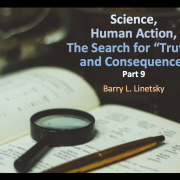Science, Human Action, The Search for “Truth”, and Consequences | Part 6: Jordan Peterson, Sam Harris: A Clash of Scientific Worldviews?

Thinking on the Potential Dangers of Science Myopia (Photo: Joao Silas, Unsplash.com)
© 2018, Barry L. Linetsky. All Rights Reserved.
F.A. Hayek, winner of the 1974 Nobel Memorial Prize in Economic Science, expressed concern that science has morphed into a “prejudice” or ideology that places the physical and biological sciences at the pinnacle of discovering and validating what is real, what is knowable, and what is true.
Hayek’s observation is that science as an endeavour has taken on the form of an ideology and has embarked on a continuing crusade to reshape our thinking about the world by translating that which we observe directly with our senses into mathematical symbols, and thereby has moved away from what science is and should be.
In The Counter-Revolution of Science, Hayek writes:
The whole history of modern Science proves to be a process of progressive emancipation from our innate classification of the external stimuli till in the end they completely disappear so that “physical science has now reached a stage of development that renders it impossible to express observable occurrences in language appropriate to what is perceived by our senses. The only appropriate language is that of mathematics,” that is, the discipline developed to describe complexes of relationships between elements which have no attributes except those relationships. (33)
Hayek’s warning is that this ill-advised scientistic crusade in the form it has taken has resulted in widespread epistemic skepticism with regard to the evidence of our senses as the foundation for the active discovery of human knowledge.
It is widely accepted amongst modern mainstream scientists that what we observe with our senses is not reality as it really is. The modern thesis is that to “see” reality, we must rely on the mathematical and theoretical insights of science, and therefore modern science instructs that we cannot trust or refer to our basic sense perceptions in interacting with the “real” world as verified and recognized by scientists, nor can we rely on the natural structure of our minds to interact with and inform us of the state of the world as it really is. Hence Hayek’s observation that “Science” has adopted and been leading a crusade to eradicate and replace with symbols what we observe with our senses as the basis for our thinking and actions to achieve human desires:
The point which we mainly wanted to stress was that what men know or think about the external world or about themselves, their concepts and even the subjective qualities of their sense perceptions are to Science never ultimate reality, data to be accepted. Its concern is not what men think about the world and how they consequently behave, but what they ought to think. The concepts which men actually employ, the way in which they see nature, is to the scientist necessarily a provisional affair and his task is to change this picture, to change the concepts in use so as to be able to make more definite and more certain our statements about the new classes of events. (37-38)
What Hayek is saying is that currently “Science” as a dominant institution of truth is not value neutral, that it is ideologically based with a normative agenda to describe not only a “correct” view of truth about the world, but also to influence the concepts we are able to validate by means of our senses in an attempt to tell us how to think and interpret our veridical sense perceptions, which modern science has allegedly determined, necessarily deceive us.
Hayek thinks this path on which Science is on is not just wrong, but dangerously wrong and a mortal threat.
This brings us back to the Sam Harris and Jordan Peterson dance about truth in science. Hayek’s observations and conclusions from almost 70 years ago get right to the core of the Harris/Peterson divide:
[T]he world in which Science is interested is not that of our given concepts or even sensations. Its aim is to produce a new organization of all our experience of the external world, and in doing so it has not only to remodel our concepts but also to get away from the sense qualities and to replace them with a different classification of events. The picture which man has actually formed of the world and which guides him well enough in his daily life, his perceptions and concepts, are for Science not an object of study but an imperfect instrument to be improved. Nor is Science as such interested in the relation of man to things, in the way in which man’s existing view of the world leads him to act. Itisrather such a relation, or better a continuous process of changing these relationships. When the scientist stresses that he studies objective facts he means that he tries to study things independently of what men think or do about them. The views people hold about the external world are to him always a stage to be overcome. (38-39)
When it comes to human beings and the study of human action, facts and values cannot be defined in physical, mechanical, materialistic terms. People are self-motivated to make the best choices they can based on their perceived needs and pathways towards the pursuit of removing the uneasiness they feel and attaining the results and values they seek.
NEXT: Part 7. In the Land of Blind Science, Volitional Consciousness is King
Mises: The A Priori Nature of Human Action (pdf)
Barry Linetsky has learned a considerable amount from the writings of Mises and Hayek. Barry makes his living specializing in value-driven strategic management, and is the author of the acclaimed business biography The Business of Walt Disney and the Nine Principles of His Success (Theme Park Press, 2017) and Free Will: Sam Harris Has It (Wrong), both available from amazon. He frequently blogs at www.BarryLinetsky.com and has been published in the Ivey Business Journal and Rotman Magazine. Twitter @BizPhilosopher.



 Barry L. Linetsky, 2019
Barry L. Linetsky, 2019






Leave a Reply
Want to join the discussion?Feel free to contribute!